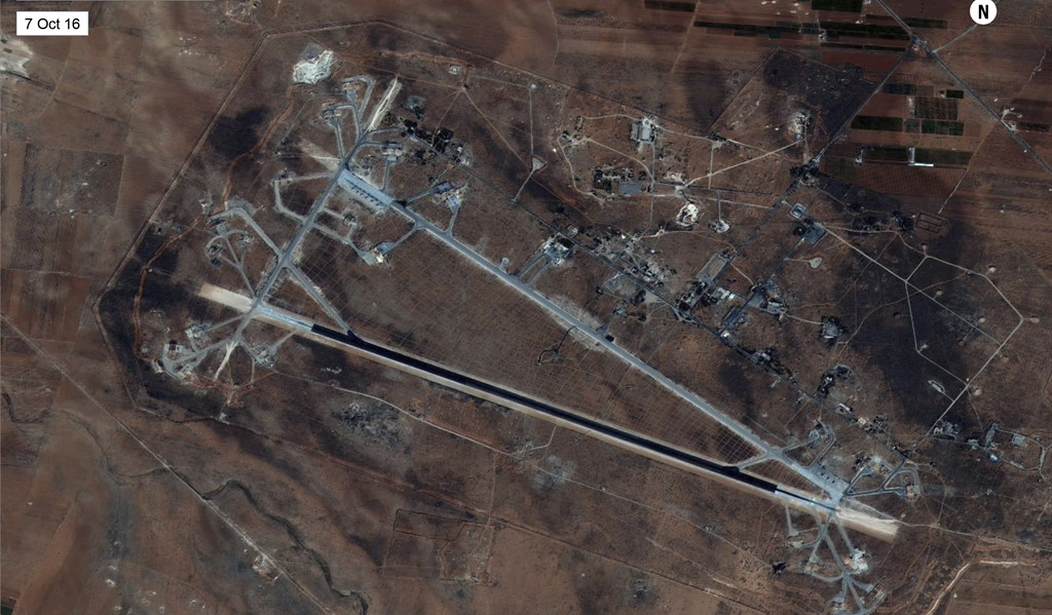Will Syria learn a lesson from the US airstrikes on its air base last night? Not if the Russians can help it. After the dust had settled at Shayrat, Russia pledged to help Syria defend itself against future reprisals, while most of the international community cheered the rebuke to Bashar al-Assad:
Russia has vowed to help bulk up Syria’s air defenses, as the Kremlin accused the U.S. of breaking “international law” by launching a deadly missile attack against an airfield Thursday night.
A “complex of measures” to beef up defenses will be completed shortly to ““protect the most sensitive Syrian infrastructure facilities,” said a spokesman for the Russian Defense Ministry.
Russian officials confirmed Friday morning that Moscow had received advanced warning of the strike on Shayrat Air Base in western Syria. The spokesman alleged only 23 of the 59 launched missiles hit the base and hadn’t damaged its runway, saying ““the combat efficiency of the U.S. strike was very low.”
The Russians got that heads-up through the “deconfliction line,” the communications system meant to inform both Russian and US military of air operations in Syria to prevent accidental attacks on each other. Russia cut off that line after the attack as a rebuke to the US, as Fox News’ Pete Hegseth reports this morning:
It’s the first suspension of the “deconfliction line” since it was implemented in 2015, ABC News notes. It’s a big deal if the Russians keep it turned off:
A U.S.-led coalition has been bombing Islamic State-held territory across Syria, launching 24 strikes on Thursday alone, according to the U.S. military’s Central Command. The coalition includes some 60 countries, with some launching their own strikes into Syria. Russia is waging its own bombing campaign in support of President Bashar Assad’s forces, while the Syrian government has its own air force and air defense systems. That means a lot of aircraft are flying in a small airspace, which raises the danger for pilots. In November 2015, for instance, NATO member Turkey shot down a Russian jet fighter, nearly sparking an international conflagration.
To protect pilots, Moscow and Washington opened a so-called “deconfliction line” after Russia began its bombing campaign in September 2015. On the U.S. side, it is run out of the Combined Air and Space Operations Center at the vast al-Udeid Air Base in Qatar, which hosts the forward headquarters of U.S. Central Command. There, air traffic controllers and senior military officers are in contact with their Russian counterparts in Syria. They share coordinates and other data to avoid midair collisions or confrontations. One U.S. pilot flying missions over Syria credited his safety to it in a recent Associated Press interview .
We’ll start escalating sorties over Raqqa soon, which will increase the potential for mistakes and misunderstandings. That cuts both ways, of course, so Russia has some interest in seeing it restored, but in the meantime both sides will need to tread carefully to avoid acts of war with each other.
Fox also has video of some of the damage done by the Tomahawk missiles:
NEW VIDEO this morning reportedly shows damage to the Syrian base targeted by United States airstrikes. https://t.co/FQHfD3vbTp pic.twitter.com/PwYzgq4YZX
— Fox News (@FoxNews) April 7, 2017
Even if Russia is clearly unhappy with the US response to Assad’s latest chemical weapons attack on his own people, that seems to be a minority view. The Associated Press has a collection of reactions from around the world, and most of them have been very supportive. Saudi Arabia offered an early congratulations on Donald Trump’s “courageous decision,” as did Turkey, but both want a full ouster of Assad as the long-term goal. Indonesia, the world’s largest Muslim nation, issued a statement of concern over “unilateral actions” while condemning Assad’s chemical weapons attack. Iran said … well, you can imagine what Iran said.
While NATO offered only a curious no-comment, the rest of our allies were more vocal in their support. The UK’s Theresa May pledged full support, while Germany’s Angela Merkel and France’s François Hollande said Assad had brought it on himself. Israel and Japan both cheered the action, and Denmark’s prime minister tweeted his approbation:
Good that the cowardly attacks on innocent have consequences. @potus and US have made it clear that Assad’s barbarity can't go unpunished!
— Lars Løkke Rasmussen (@larsloekke) April 7, 2017
Most interestingly, the voices of noted populist movements in Europe offered the sourest notes outside of Tehran and Moscow. Marine Le Pen, whose politics is often said to overlap with Trump’s, distanced herself from this action:
French far-right presidential candidate Marine Le Pen says U.S. President Donald Trump is trying to be the “world’s policeman” with airstrikes on Syria and is suggesting that it could backfire.
Le Pen has expressed support for Syrian President Bashar Assad in the past, and said on France-2 television Friday that she was “surprised” by Trump’s sudden move.
The Italian government expressed support for the reprisal, but populist and conservative opposition parties blasted it:
Italy’s largest opposition group, the anti-establishment 5-Star Movement, condemned the U.S. attack and demanded Italy not get drawn in. The opposition center-right Northern League party called the strikes a “gift to ISIS,” the Islamic State group.
It’s quite the shift for the populists — and for Trump himself — on where praise and condemnation originates.








Join the conversation as a VIP Member